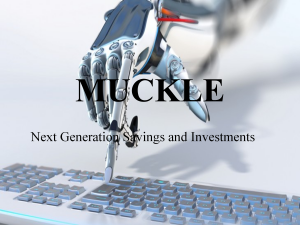Jun
2016
Selftrade: ETFs ‘Best’ for Investors
DIY Investor
25 June 2016
Online stockbroker Selftrade is to encourage investors to use index tracking exchange traded funds (ETFs) with reduced commissions and a tool to compare returns with actively managed funds.
Operations Director at Selftrade, Richard Donegan, is championing ETFs and wants to ‘bring them to the forefront because we believe it is in retail investors’ best interest to invest in ETFs’.
ETFs enable investors to buy any stock market index in the same they would a share. By tracking the index rather than trying to beat it ETFs believe they can offer lower charges and better total returns than active funds which often fail, to beat the index return by active stock selection.
‘we believe it is in retail investors’ best interest to invest in ETFs’
Selftrade is launching a tool to help investors compare the ‘end result of investing in ETFs versus mutual funds’, said Donegan. ‘The tool will provide more easily digestible information and will be able to inform you about the greater return on ETFs compared to mutual funds,’ he said.
Although he said ‘ETFs do not always come out on top’ when compared to the returns on mutual funds he said they offered other benefits, such as the ability to trade in them at any point during market hours. By contrast, most open-ended funds – unit trusts and OEICS – are priced daily.
‘ETFs are cheaper and have more liquidity,’ he said, adding that the pricing was more up-to-date on ETFs than mutual funds so investors know where they stand.
‘We believe customers should explore these things and we are giving them pound and pence comparisons [between the returns of ETFs and mutual funds] to give them encouragement to do so,’ he said.
After Equiniti purchased the online broker from French Bank Societe Generale in 2014 it pledged to leave charges unchanged for 12 months but has now revamped them, including a reducing in ETF trading costs from £12.50 to £9.99.
ETF investments currently only represent 4% to 5% of Selftrade’s transactions, the rest being in funds and shares, but Donegan expects the percentage to grow, following the example of the US. ‘We have not projected the figures exactly but I wouldn’t be surprised if we did get to 15% or 20% of transaction in 10 years,’ he said.
The driver for this growth will be linked to the greater control individuals have over their pension pots thanks to pension freedoms and the introduction of lifetime ISAs next year.
To keep up with the increasing number of people taking their pension and ISA investments into their own hands, Donegan said Selftrade is looking at the option of offering advice to investors.
‘Selftrade is looking at the option of offering advice to investors’
He said the service would not be full financial advice delivered by a qualified adviser but a more limited ‘robo-advice’ model.
Popular in the US, these digital investment managers use algorithms to deliver a model portfolio to a client based upon information they provide such as income, the amount saved, assets, future plans such as retirement date, and tolerance for investment risk. The asset allocation is then monitored and rebalanced according to movements in the market.
‘Robo-advice will be a big part of what everyone does,’ said Donegan. ‘It would be technology within a process to take you through your objectives, risk profile, time horizon and from that…you would be matched up with a model portfolio.
‘It is very big in the States and we are three or four years behind – there is a market for it…It is simple and transparent and the customer who needs advice but who won’t or can’t pay for advice can get it.’

Leave a Reply
You must be logged in to post a comment.